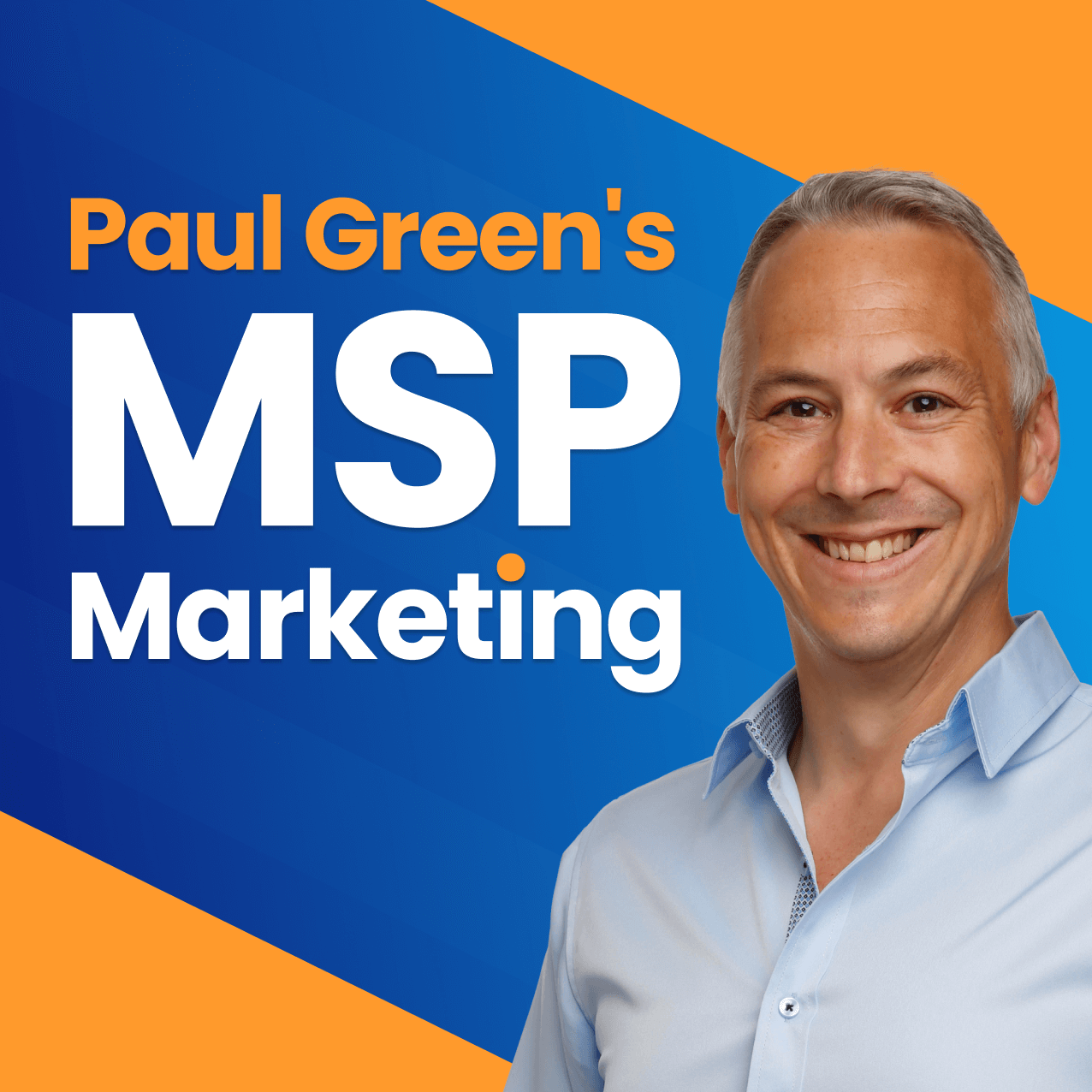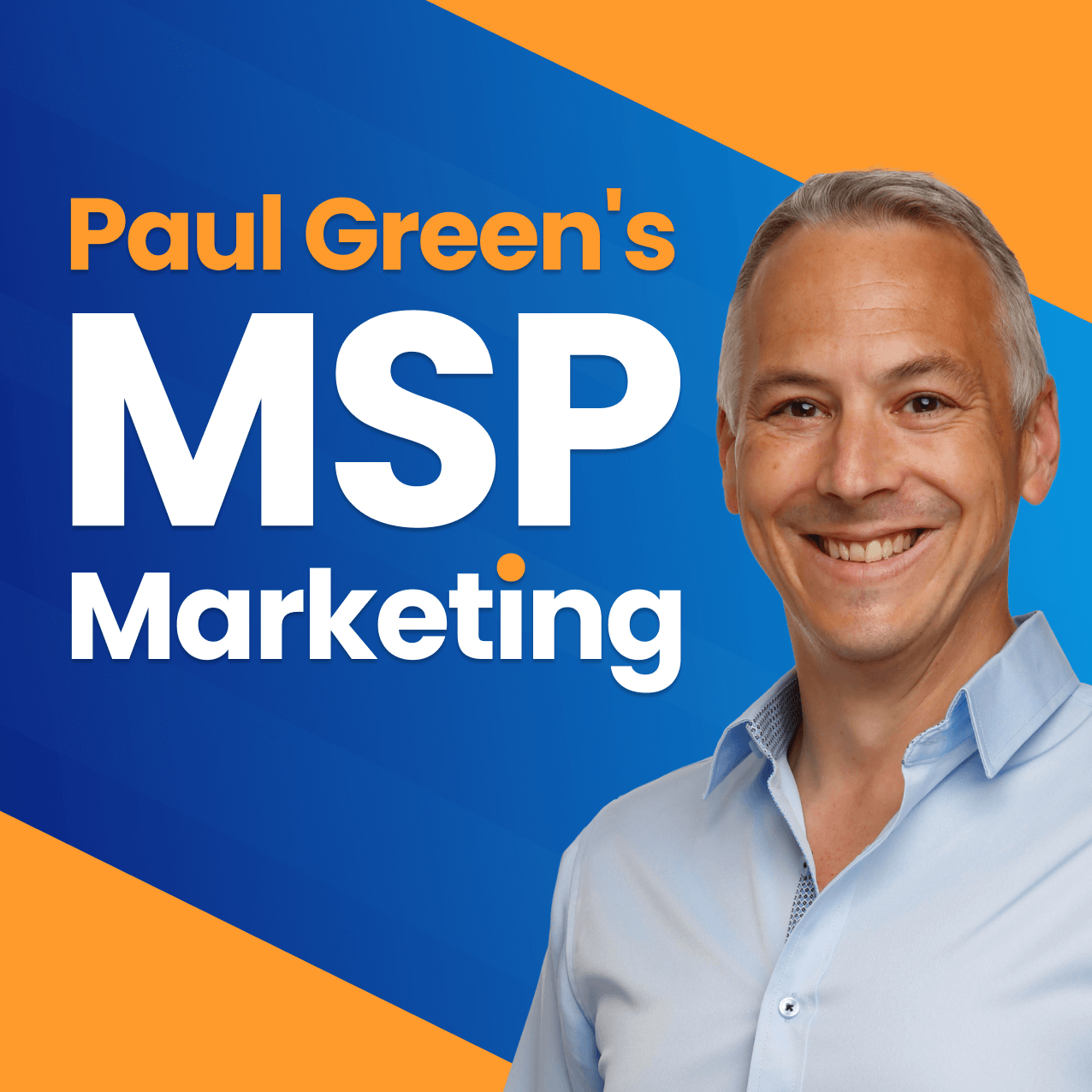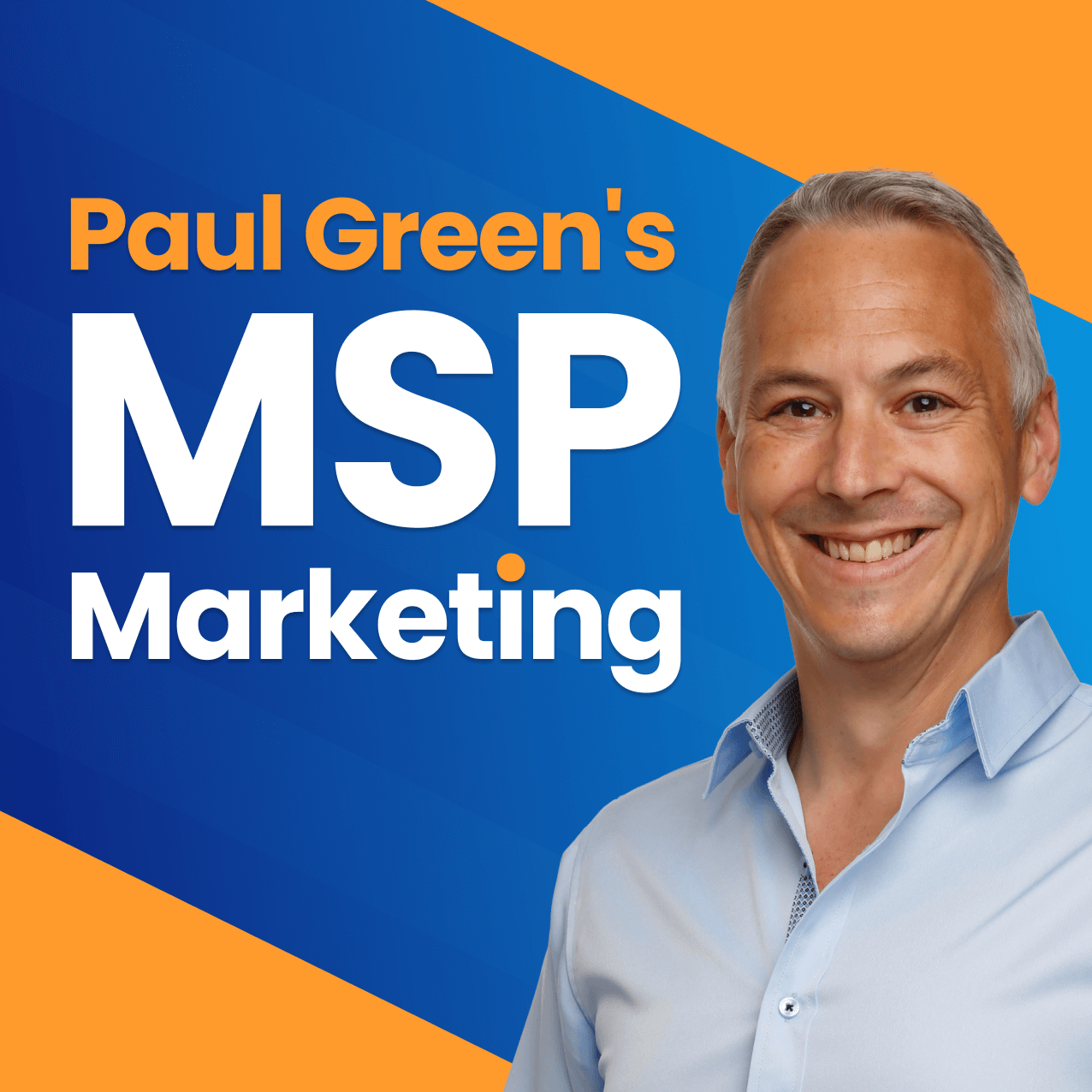SPECIAL: How to own an MSP doing $7m a year
Description
The podcast powered by the MSP Marketing Edge
Welcome to this SPECIAL edition of the show, Episode 269, of the MSP Marketing Podcast with me, Paul Green.
This week I’ve got the last of my special episodes for you, where you’ll discover how my guest grew his MSP to 450 clients, 35 staff and $7m revenue.
How to own an MSP doing $7m a year
Featured guest: Steve McNamara is the visionary founder and CEO of DTC, Inc., an MSP that has been a cornerstone of IT support for over 25 years. Established in 1999, DTC began as a small operation focused on serving the dental community, quickly evolving into one of the largest dental IT support companies in the Mid-Atlantic region. Under Steve’s leadership, the company has expanded its reach beyond Maryland to include clients in Virginia, Delaware, and Pennsylvania, now boasting over 450 clients and a dedicated team of more than 35 employees.
Steve built DTC from the ground up with his first hire, Scott Leister, who now serves as the DevSecOps engineer. Steve has remained committed to the core mission of making IT work for clients through innovative solutions and meaningful connections. His philosophy of “doing the next right thing” has guided the company through various challenges, ensuring that client needs are always prioritised.
DTC has a strong emphasis on values and culture. Steve believes in hiring individuals who align with the company’s core values rather than merely filling roles. This commitment to culture is reflected in initiatives such as hiring a Chief Flourishing Officer and conducting quarterly skill-building sessions and all-hands meetings, where every team member has a voice. This focus on values not only attracts talent but also fosters a loyal and engaged workforce.
How would you like to own an MSP doing $7 million a year where you personally do none of the tech work? There’s nothing more motivating than hearing how other MSP owners have built up their business. And in this week’s special episode, you are going to discover how this guy grew to 450 clients, 35 staff, and $7 million revenue. What I think you’ll love is his unique approach to his people and how he’s kept the quality of the tech work really high without having to do any of it himself.
Hi, I’m Steve McNamara. I’m the CEO and founder of DTC Inc. We are an MSP here in the Maryland DC, Northern Virginia region of the United States. We’ve been incorporated for a little over 25 years now and serving primarily into the healthcare and dental space, but now moving into the CMMC space as well. And that’s the very short, skinny version of who we are.
I love it. Thank you so much for joining us on the podcast, Steve. I think my favourite episodes of this podcast over the last five years or so have been when we’ve had real MSPs on who have shared their stories of how they did it. So you’ve been going, I think you said more than a quarter of the century, what was it that made you start your first business or start this business in the first place?
Well, we had a 2 year old son and my wife told me to get a bleeping job.
Were you working in it before?
Part-time, I actually, I had a health food store in rural county in Maryland and it was failing, but I was more interested in the natural food industry and alternative healthcare than I was tech. I did tech on the side to try to pay the bills and my wife was tired of us not having enough money to pay the bills and to eat. So that’s why she told me to get a real job.
I love it. And obviously 25 years on, you’re still here doing tech and you haven’t gone back to natural foods unless that’s some kind of side hustle. So paint the scene for us. We’re talking I guess end of the nineties early noughties. What was the tech like then and was it a break fix shop that you started or was it something different?
Yeah, it was a break fix. I mean, the guy that I was doing some subcontracting work for, he did some work in the dental space for a young lady that sold dental practice management software. So we did a fair amount of dental offices and she was leaving the industry and that company was looking for a salesperson and I had a background in sales from my early twenties. That career ended due to addiction issues. So I was in recovery for addiction and didn’t want to go back into the financial planning world and the tech world was calling my name. It wasn’t really where I wanted to go, but those were the doors that were opening for me. So that’s ultimately where I landed.
Now I think at this point it would be really good to set some context of what you’ve achieved in the last 25 years. So that was you back then, one man band by the sounds of it, starting out in tech, not wanting to be in tech, which is really interesting. Where are you today in terms of the size of the business, just so we can understand how far you’ve come on that journey?
Sure, so we will pass 7 million in revenue this year sitting at roughly 37 employees. I don’t sell anything anymore. I don’t fix anything anymore. I spend most of my time now either mentoring some of the younger leaders in the company or a big part of what our growth looks like moving forward into the future. So most of my time here now is either implanting the future or developing talent and helping the younger generation find their way into the next phase of what we’re doing.
Okay. So here’s an interesting question. You started this business because you had to rather than that you really wanted to from what you’ve said. And yet 25 years on, you’ve got a substantial enterprise and anyone who’s been in business for more than 10 minutes knows that growing a business is hard. It doesn’t happen by accident. It’s something that you really have to keep pushing to do. So was there a point at which your desire to grow the business changed or were you just constantly trying to get yourself away from having to do the work or what was it that led to the big growth in the business?
It was never running away from the work. I come from a blue collar background, so the work part of it never really phased me a whole lot. Having a young family, obviously financial independence was a big deal. My wife was in the arts, so she had a ballet school. And if there’s anything about ballet schools, you know they don’t make very much money. That’s more of a work of pleasure than it is of any kind of financial reward. And what started to happen is I started to find that I was enjoying the wins, what I called Santa Claus moments. And the Santa Claus moments for me was when I could walk into an office and take them from paper and chemicals to a completely digital office and how excited they were to have made this huge quantum leap in their business. And I was really at the heart of how that was happening, and I found that I really enjoyed that part of it.
And that’s really what started to drive that. I met some really good people along the way who were running successful enterprises in the same vertical in the dental space, who were kind enough to share a lot of information with me about business, about how to run a business, about how to get out of the way, how to hire people. I had a lot of good mentors along the way that were willing to share. And it’s one of the things we still continue to do here now. We mix that up with other CEOs where I’m on regular calls with other CEOs of MSPs and we leave it all open. We share everything that we’re doing because none of us really see each other as a threat or competition. It’s more a matter of like, Hey, don’t go do that because that’s a train wreck, or look at this piece of software because this is really valuable and it’s good for your clients. So that’s really what happened, Paul, is I fell in love with something I didn’t really want to do.
Yeah, yeah, I love that. And you’re right, I think the Channel is one of the few, a tiny number of sectors where you’ll have direct competitors collaborating with each other and it’s a common thing amongst MSPs, which is a really cool thing to see. I’ve worked in other sectors in the past and you do not get that in many other sectors. So was there a point at which you sort of realised, actually we’re onto something here. The business is growing, I’m enjoying taking the money home, I’m enjoying those Santa Claus moments, and was there a point at which you said, actually, let’s see if we can get beyond a million dollars or $2 million, or is it simply a case that you’ve just continued to grow organically and here we are sitting talking near the end of 2024 and you’re sat on that 7 million?
Yeah, it’s a combination of the two. So organically we were growing, I think I was probably three, four years as a solo single man shop. And I hired my first employee who actually is still here with me today. He’s one of my senior people. And we started to expand in little bits and pieces. The work kept coming and I kept finding good people to join the team. And the other thing that I found along the way was is that specifically to this guy Scott, who started with me at the very beginning, if I didn’t start giving him other challenging things to do, I was going to lose him. So one of the things that I learned quickly was if I didn’t want attrition, I had to continue to grow.
I had to give people roles to work into and different things to do because nobody wants to fix printers and scanners their whole life.
<st









